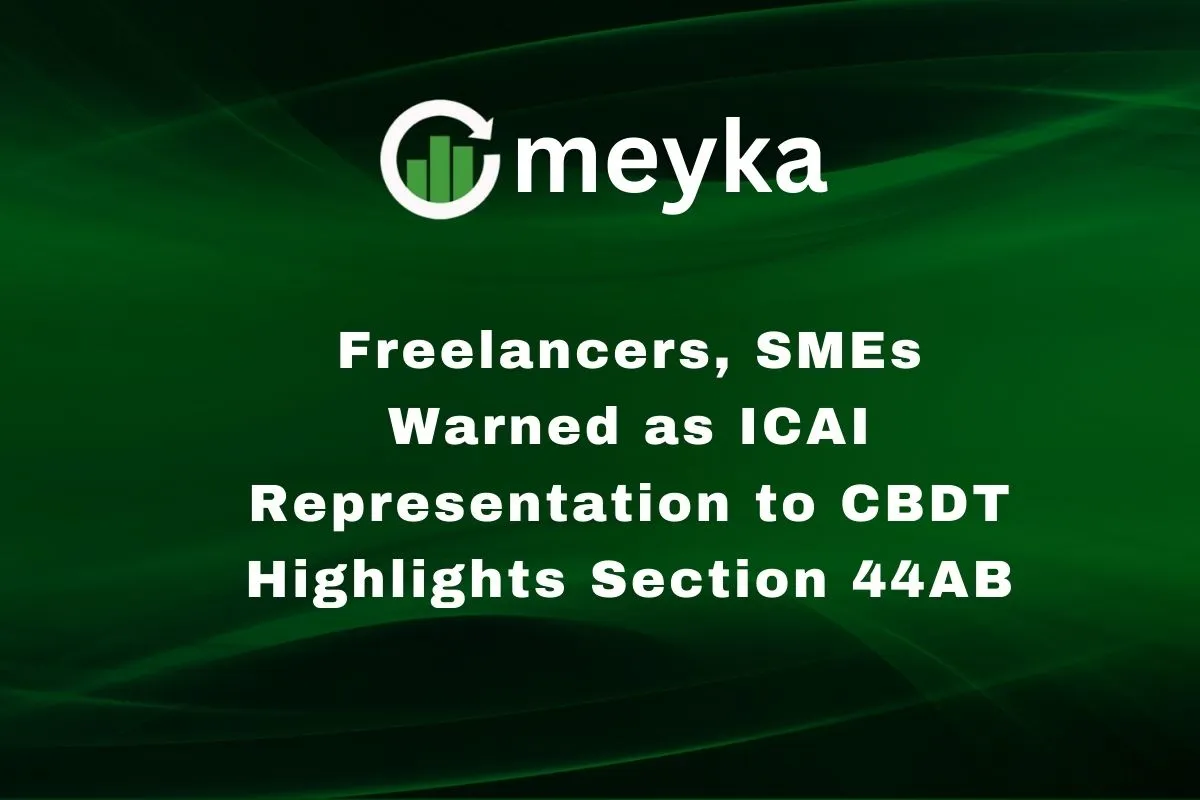Freelancers, SMEs Warned as ICAI Representation to CBDT Highlights Section 44AB
The Institute of Chartered Accountants of India (ICAI) has raised serious concerns with the Central Board of Direct Taxes (CBDT) about Section 44AB of the Income Tax Act. This section makes a tax audit compulsory once income or turnover crosses a set limit. Many freelancers, small businesses, and startups are now reaching that point because of the rise of digital work and online trade. We see more content creators, IT consultants, and e-commerce sellers earning at levels once linked only to large firms. While this growth is positive, it also brings new tax duties. ICAI believes the rules need clarity and relief so that genuine taxpayers are not overburdened.
This issue matters to us all because compliance is no longer optional. Understanding what ICAI has said and how it may affect freelancers and SMEs helps us prepare for smarter and safer financial decisions.
Recent ICAI Representation & Key Changes
We from ICAI (through its Direct Taxes Committee) have made strong representations to the CBDT. These include:
- Revised Guidance Note (2025) under Section 44AB, to match new laws (Finance Act, etc.) and reporting requirements.
- Changes in Form 3CD (used in audits), effective from 1 April 2025, include more disclosures, clauses to fill, and stricter reporting.
- New guidelines to cap the number of tax audit assignments per partner (CA) from FY 2026-27: no CA partner may accept/sign more than 60 tax audits per financial year under Section 44AB.
- Requests for extension of audit due dates due to delays in utility release, technical glitches in portals, etc. ICAI has asked CBDT to align due dates and ease pressure on SMEs/freelancers.
Impact on Freelancers & Professionals
For those of us working independently, consultants, developers, doctors, architects, etc., these changes matter a lot:
- If your gross receipts exceed ₹50 lakh, you must undergo an audit. If you mostly receive payments digitally and keep cash receipts/payments under 5%, you might qualify for relief under certain rules. But the professional thresholds still apply.
- For freelancers under Section 44ADA (specified professions), the resumptive scheme lets you declare 50% of receipts as income without full books. But if you declare less or cross the limit, a tax audit becomes compulsory.
- Digital receipts, banking channels, and compliance with proof of non-cash transactions are now more critical. If you don’t keep good records or fail to meet the criteria, you could lose exemptions.
Impact on SMEs & Small Businesses
For small firms, shops, start-ups, e-commerce sellers:
- The ₹1 crore turnover threshold is key. If you cross it, an audit is mandatory unless the digital transaction criteria push you to the ₹10 crore limit. Many SMEs may assume they’re safe, but sudden growth or increased cash dealings can push them into audit territory.
- The new cap of 60 audits per CA partner may reduce the availability of CA services in busy markets. SMEs may find limited CA capacity near the deadline. It increases demand/supply pressure.
- The increased disclosure demands (Form 3CD, etc) mean more effort: bookkeeping, documentation (bank statements, details of receipts/payments, GST, etc). This adds cost.
Penalties & Consequences
What happens if we ignore or miss these rules?
- Under Section 271B, if an audit is required but not done, the penalty is 0.5% of turnover or gross receipts, capped at ₹1,50,000.
- For delayed audit reports or late ITR filing with audit, you may be penalised and possibly lose certain benefits. Timely filing is essential.
- If you can show a “reasonable cause” (e.g., disaster, illness, loss of records, technical issues), then the penalty may be waived. But such cases need documentation.
Relief Measures & What We Want
ICAI has proposed some measures, and many are being discussed:
- Request to extend deadlines & align due dates so audit and ITR deadlines match more comfortably.
- Clearer guidance on what counts as “reasonable cause” to avoid penalty.
- More awareness programmes/webinars for SMEs/freelancers to understand new forms, disclosures, and digital receipts proof. ICAI is doing some.
Steps We Should Take (As Freelancers / SMEs)
To stay safe and compliant, here are actions we should take:
- Track turnover/receipts carefully: Know when you cross the threshold. Combine all business & professional incomes.
- Go digital wherever possible: Use bank transfers, UPI, and credit cards. Keep receipts and statements. If ≥95% transactions are non-cash, you may get a higher threshold.
- Keep good books: invoices, expenses, accounts. Even if using presumptive schemes, you need minimal documentation.
- Hire/consult a CA early: don’t wait for the audit deadline. With CA partner caps, waiting late may cost you the ability to find an auditor.
- Stay updated on ICAI/CBDT notices/guidance, since rules/forms keep changing (Form 3CD clauses, audit caps, etc.).
Conclusion
We are entering a phase where regulatory compliance is tighter. ICAI’s representation to CBDT signals increased focus on Section 44AB, on deadlines, audit load, digital proof, and CA accountability. Freelancers and SMEs cannot treat tax audit as someone else’s concern. As rules become stricter, ignorance or delay can result in financial penalties. But with early prep, good records, and awareness, we can stay compliant without undue stress.
FAQS:
Section 44AB is a rule that makes tax audit mandatory. If turnover or income crosses set limits, a Chartered Accountant must check accounts and file a report.
As per ICAI, each Chartered Accountant partner can sign a maximum of sixty tax audits in one year under Section 44AB. This rule applies from April 2026.
Businesses crossing one crore turnover, professionals earning above fifty lakh, or firms with mostly cash dealings must get their accounts audited under Section 44AB by a Chartered Accountant.
Disclaimer:
This content is for informational purposes only and is not financial advice. Always conduct your research.






